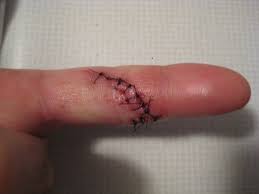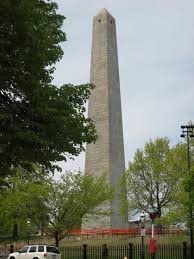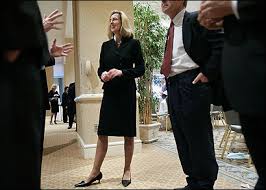Self-Mutilation on Rise Among Motivational Speakers
by Con Chapman
CHARLESTOWN, Mass. Over the course of his life Butchie Dorr has tried a variety of techniques-some legal, some not-to keep his body and soul together. “I scalped tickets for awhile, then I caught on as a bus driver for the T,” the Boston area's public transit authority. “Then I went out on disability for a couple years until they snuck into the bowling alley one Tuesday night and caught me playing candlepins.”
After scuffling around for a few years, Butchie is excited about his latest career change; he has signed on with Face Time International, a local speakers bureau, and will begin a career as a motivational speaker—as soon as he can figure out how to lose an appendage without killing himself in the process.
“If you want to be a successful motivational speaker these days, it is essential that you be blind, paralyzed or somehow disabled,” says Paul Welch, president of Face Time. “Top speakers can make a lot of money, but with Butchie we're going to start small and see where it goes.”
So Butchie is sitting in his kitchen, facing a speaking engagement at the Young Presidents Club of Boston, an organization of local executives. The title of his speech? “How I Overcame Adversity to Be the Man I Am,” an emotional account of his recovery from the injury he will inflict upon himself today.

“I read in the Wall Street Journal there where that blind guy who climbed Mt. Everest makes two mill a year,” he notes with approval as he rubs alcohol on his finger. “I'd like to get me a piece of that.”
With his wife Doreen by his side, Butchie makes a fist with his left hand as he prepares to stick his right index finger in the maw of a Rival brand electric can opener.

“You ready?” Doreen asks Butchie. He purses his lips and, after downing a shot of Jameson's Irish whiskey in one gulp, nods his head. Doreen takes Butchie's right hand, steadies it in the narrow space between the white plastic body of the machine and the cutting wheel, counts down “One-two-three”—and slams the chrome handle down.
“Jesus H. Christ!” Butchie screams, and pulls his hand away immediately.
“Lemme see,” Doreen says as she holds her husband's hand up for inspection. “Nice,” she says with admiration. “Good clean cut, real ugly lookin'.”

Butchie continues to scream as Doreen holds his hand under cold water from the kitchen faucet, pats it dry with a paper towel (“Bounty—the Quicker Picker Upper!” Doreen says with a laugh), then wraps a piece of gauze around the gaping wound. “Let's get you taped up,” she says as she secures the oversize pad with a piece of white adhesive tape. “Okay, what's next?”
“Now I gotta climb something,” he says as the white bandage on his finger quickly turns red.

“I'll drive you up to the Monument,” Doreen says, referring to the granite obelisk that sits atop Bunker Hill, site of one of the most famous battles of the Revolutionary War.
The Dorrs' 1994 Toyota sputters up the street and Doreen drops Butchie off at the curb. “See you later,” she says.
“You ain't gonna come wit' me?” he asks, a pained expression on his face.
“Naw—I gotta take the kids to hockey, remember?”

“Oh, right,” Butchie says, recalling that his twin boys, Sean and Kyle, have a tournament game against archrival Somerville. “Well, see you later. Thanks for your help.”
“No problem,” Doreen replies, then adds wistfully, “Love you.”
“Love you too,” Butchie says, and he makes his way up the hill to the Cleopatra's needle that sits at the heart, if not the liver, of this blue-collar town just north of Boston.
Butchie sizes up the monument and begins his climb, stopping every now and then as his finger begins to throb. “Must be the altitude,” he tells himself, and indeed by the time he is halfway up the internal iron staircase his heart is racing and his bandage is more red than white.

He finishes after a half hour's stop-and-go progress and allows himself a peek out the narrow windows at the skyline of Boston off in the distance. “This was tough, but it's gonna mean a better life for my family,” he thinks as tears well up in his eyes like morning dew on the skin of a Vidalia onion.
Butchie takes the Orange Line subway into Boston where he gets off at the Old State House, the site of the “no taxation without representation” speech that stirred the hearts of the colonists. He stops and asks for directions to 60 State Street, where a roomful of high-powered business men and women awaits him.
After a few moments of difficulty getting past the first-floor security guards, Butchie is on his way to the 34th floor, where floor-to-ceiling windows provide him with some perspective on how far he's come today, literally and figuratively, from his tough neighborhood to the rarified atmosphere of a private dining club.

“Mr. Dorr?” Butchie's reverie is interrupted by Barton Hicks, the club's executive director.
“That's me—in living color!” Butchie replies enthusiastically, eager to begin his new career.
“I think we're just about ready for you, if you'd like to take a seat at the dais,” Hicks says.
“The what's-is?”
“The dais—up there,” Hicks says, pointing to a table set in front of a window on the other side of the room.
“Sure-wherever you want to put me.”
Hicks and his featured guest make their way up to the rostrum, where the executive director silences the members' chit-chat by tapping a fork on a water glass.
“Ladies and gentlemen—if you wouldn't mind, I think we're ready to begin today's program. We have with us today a man who has overcome virtually insurmountable difficulties in his life, and who can serve as an inspiration for us all. Please welcome—Mr. Butchie Dorr.”
The assembled tycoons applaud politely, a foreshadow of the thunderous applause that Face Time's inspirational speakers usually generate by the time they've finished their stirring tales of how they beat the bad hands that life has dealt them.
“Thank you very much,” Butchie begins. “I really appreciate that. Geez, I feel kinda underdressed,” he begins, noting that the audience is wearing business suits and dresses while he has chosen a Hollywood Choppers jacket that he bought to celebrate his first gig.
“First of all, let me start by saying, none of youse has nothin' to be ashamed of, cause down deep in side of youse is something that you couldn't sell for all the money in the world.” He pauses for effect, and every eye in the house is on him.
“You can't bottle it, you can't wrap it up and tie a bow around it, cause it's,” Butchie pauses to check a 3X5 note card, “ee-phem-er-al.” Impressed by his own eloquence, Butchie smiles before continuing. “It's the human will, which, like Schopenauer said, is what the world is, along with representation.” Face Time provides all of its speakers with inspirational and high-toned anecdotes and quotes that they can use to dress up their speeches.

Arthur Schopenhauer: Always good for a laugh.
“I mean,” Butchie continues, “just this mornin' I was sittin' in my kitchen when I nearly cut my freakin' finger off! And not more than like twenty minutes later, there I was, climbing the Bunker Hill monument. Now if that ain't inspirational, I don't know what is.”
Butchie checks his notes but he has dropped one of his cards on the subway, and so skips over the meat of his planned presentation and ends up looking at his concluding remarks.
“And so I says to youse, if you don't blow your own bazoo, there's nobody gonna blow it for you. Thank you very much, and be sure and tip your waiters and waitresses,” he concludes, using a line he understands from comedy clubs is the traditional peroration used when speaking in refined settings. The assembled members, who are not allowed to tip the help under club rules, exchange puzzled glances.
“Thank you very much Mr. Dorr,” Hicks says a little nervously as he glances at his watch and sees that he has twenty minutes left to fill. “I'm sure Mr. Dorr would be happy to answer any questions you may have,” he says to the audience.
“Sure,” Butchie says. “Fire away!”
A elderly, grey-haired man in a boxy suit raises his hand and rises slowly.
“Yes—Mr. Isham,” Hicks says graciously.
“I just want to know,” he begins in a frail voice, “how much the club paid you for that wagon-load of bull you just dumped on us?”
Hicks helpfully repeats the question for members of the audience who didn't hear it. “Mr. Isham asked how much Mr. Dorr was paid.”
“Eight hundred fifty smackers,” Butchie replies, “and believe me I can use it. I got no tread on my tires and we gotta drive my kids all over creation for their hockey,” he says with a smile, expecting laughter to follow. Hearing none, he continues. “Next question.”

Q&A
A prim-looking woman in a knit skirt and jacket ensemble rises. “What exactly is your disability—I don't believe you told us.”
“Ain't that the way it always is—you forget the most important part,” Butchie replies sheepishly. “I cut my finger in the goddamn can opener this morning—hurt's like a bitch too.” He notices that the women's face turns a lighter shade, and adds, “Excuse my French.”
“Anybody else?” Hicks asks. “No one? Well, thank you very much, Mr. Dorr, for those moving remarks. We have a little token of our appreciation for you.”
“Oh, geez, you didn't have to do that,” Butchie says modestly. “The check is gonna be enough.”

“No, this is for you,” Hicks says as he hands him a Steuben glass figure of Don Quixote astride his spavined horse, Rocinante. “May you continue to tilt at windmills the rest of your life.”
“What the hell is this thing?” Dorr says with a mock-quizzical look on his face as he holds it out at arm's length for inspection.
“It's Don Quixote de la Mancha, who exemplifies the man who dreams an impossible dream.”
“Donkey who?” Dorr asks before fumbling the statue and dropping it to the floor, where it shatters into pieces.
“Good Lord!” Hicks exclaims. “That cost $350!”
“Christ amighty!” Dorr yells. “Somebody get the Dustbuster!”
Available in Kindle format on amazon.com as part of the collection “Yes I Can't!”
|
1
fav |
1137 views
2 comments |
1986 words
All rights reserved. |
Author's Note
The author has not attached a note to this story.
Other stories by Con Chapman
Tags
This story has no tags.
Groups
-
the comic story

Public group71 members

...in a cabin DOWN BY THE RIVER...oops **CRASH!!!!** *
Strange cosmic convergence: both Neil Young and Chris Farley use "DOWN BY THE RIVER."